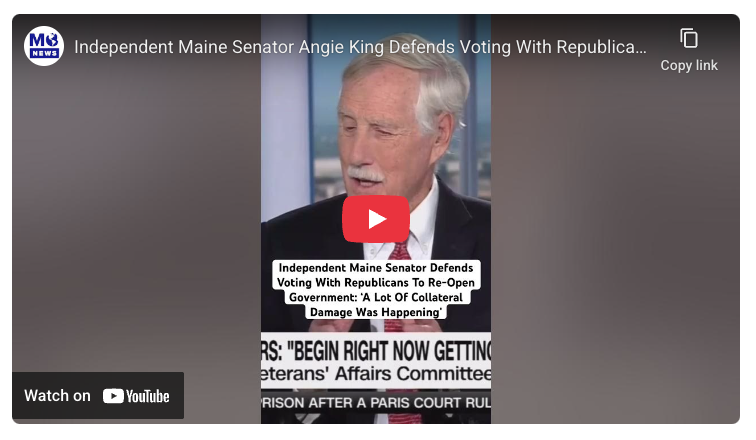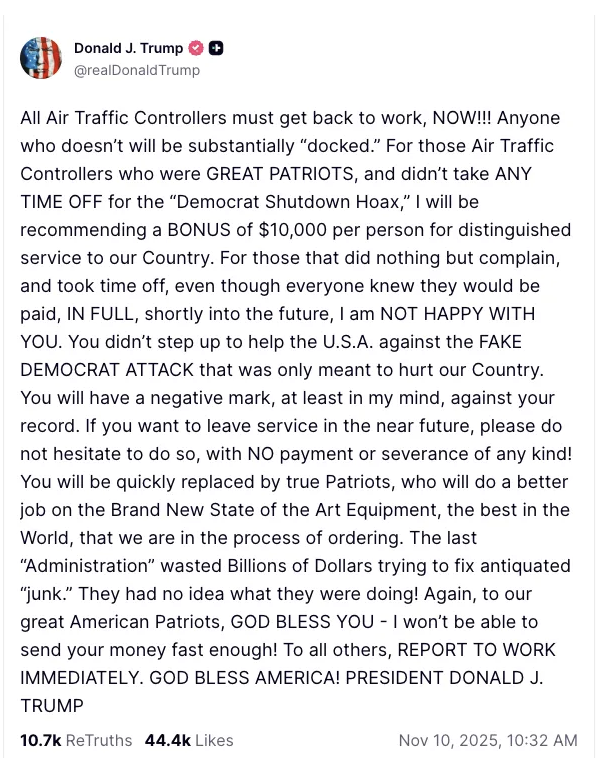Senate Moves To Pass Bill Ending Government Shutdown – But When Will It Actually End?
The Senate took a major step toward ending the longest-ever government shutdown in U.S. history Sunday night, as eight centrist Democrats crossed party lines and joined Republicans to advance a federal funding bill in a 60-40 vote. Democratic leaders are are not happy with the deal, but several moderates felt the shutdown was creating too much pain for tens of millions of Americans.
It was just the first of several procedural votes needed to reopen the federal government — a process that will likely take several more days and could still be derailed by a single lawmaker defecting.
Meanwhile, thousands of flights across the U.S. have been delayed or cancelled each day since the FAA announced a reduction in flights at 40 airports last week — largely in response to air traffic controller shortages, as federal workers haven’t been paid in a month and some are working other jobs to make ends meet.
WHAT’S NEXT?
The Senate voted on a resolution to fund the federal government through Jan. 30. It also includes three appropriations bills that would fund the Department of Agriculture – with full SNAP benefits through next September – and other departments through next fall. That prevents another SNAP/Food Stamp fiasco if the government shuts down again before then. The compromise bill also reverses thousands of firings of federal workers last month and guarantees back pay for all federal workers, who have been without pay since the start of the shutdown on October 1. Senate Republicans have also promised to hold a vote to extend Obamacare insurance subsidies next month—but didn’t guarantee an actual deal many Democrats were seeking.
The Senate is now meeting to combine key parts of the deal into a single legislative package for a final vote. Because the process requires unanimous consent, any one senator could slow things down — though leaders remain confident a bill will ultimately pass.
Once the Senate passes the bill, the House will need to do the same. During a press conference on Monday, House Speaker Mike Johnson told representatives to begin returning to Washington immediately if the Senate moves to fast-track their vote today. Many members have been in their home districts, as the House has been out of session since Sept. 19.
Ultimately, President Trump has to sign the deal for the government to reopen. He’s been facing mounting pressure to do so as Americans increasingly disapprove of the president’s handling of the shutdown, more-so than either Democrats or Republicans in Congress.
HOW DID THE SENATE BILL PASS?
Eight members of the Senate Democratic Caucus voted with Republicans to reopen the federal government, despite the bill not promising a key aspect of what Democrats have been fighting for: a guaranteed extension of the Affordable Care Act (ACA) tax subsidies that are set to expire at the end of the year.
Without these subsidies, health care insurance premiums will more than double in 2026 for those eligible and enrolled via the ACA marketplace.
In return for voting in favor of the funding measure, Democrats only secured a promise from Senate Republicans to hold a vote in December on extending healthcare subsidies. Republicans had insisted they would not negotiate healthcare policy until the government is reopened, and while they have agreed to bring the subsidy issue to a vote, they have not committed to approving an extension.
DEMOCRATS DIVIDED
However, House Republicans haven’t committed to even hold a vote. The lack of guarantees are frustrating to Democrats who felt they had momentum after 40 days. Senate Minority Leader Chuck Schumer (D-NY) voted against the package on Sunday, along with most Democratic senators. They stood firm that a vote should’ve only been reached once Republicans had guaranteed extending the health care subsidies.
“Pathetic,” wrote CA Gov. Gavin Newsom on X. Sen. Chris Murphy (D-CT) said, “There’s no way to defend this.”
Meanwhile, Angus King (I-ME), one of the eight who joined Sunday’s vote, defended his decision to CNN Monday morning: “The question I was wrestling with is if the tactic isn’t working, and there were no prospects that it was going to work, then let’s move on; not make a lot of other people suffer, in order to get a goal that wasn’t attainable,” King said.
Notably, King also added he thinks a health care bill only has a 25-50% chance of passing — though he says that’s more than it had before.
AIRLINES STRUGGLING WITH MASS DELAYS
Delays and cancellations at airports have only gotten worse as the shutdown rounds its 41st day. As of publication, more than 7,000 flights within, into, or out of the U.S. were delayed Monday and more than 2,000 cancelled. On Sunday, more than 10,000 were delayed and 3,000 cancelled.
Around 13,000 air traffic controllers have been working without pay for a month during the shutdown. Many have been calling out of work as they face increasing financial pressure to pick up second jobs or step in on childcare.
Delays and cancellations are expected to continue – and possibly increase – throughout the week. If the shutdown continues, the Federal Aviation Administration will order airlines to reduce flights at major hubs by up to 10% on Friday. (That’s up from 4% last Friday.)
Delta Airlines recorded the highest number of flight cancellations, while Southwest saw the most delays.
Transportation Secretary Sean Duffy said that even if the government shutdown ends this week, it would not immediately stop delays. It will take time before air traffic controllers make it back to work, he said — meaning the delays could affect Thanksgiving travel.
Meanwhile, Trump sent a stern warning to air traffic controllers:





